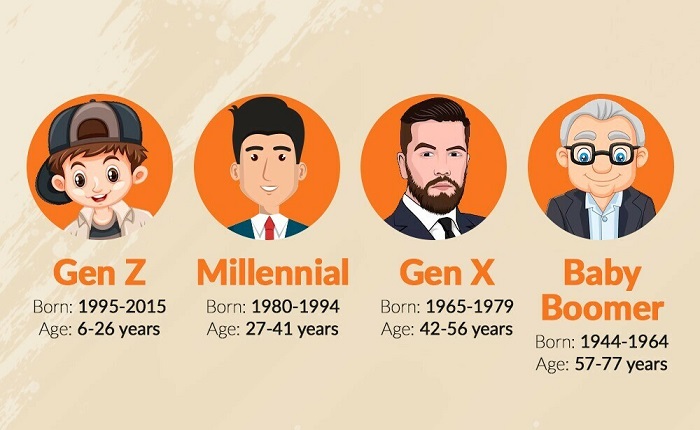Generation X: The Forgotten Middle Child of Modern Generations

Introduction
Generation X, commonly referred to as “Gen X,” represents those born between 1965 and 1980. Sandwiched between the more talked-about Baby Boomers and Millennials, the Gen X years are often overlooked in popular discourse. However, this generation has contributed significantly to shaping the world as we know it today. This blog post delves into the unique characteristics, challenges, and achievements of Generation X, while exploring why they are known as the “middle child” of generations.
Defining Generation X: The Gen X Years Explained
Generation X encompasses those born from 1965 to 1980, a period marked by significant social, cultural, and technological changes. The Gen X years saw the rise of personal computers, the internet, and a new era of global connectivity. Known for their independence and resilience, Generation Xers were often left to fend for themselves, a result of the high divorce rates and the rise of dual-income households during their formative years.
The Cultural Milestones of the Gen X Years
The Gen X years are notable for the explosion of pop culture. MTV, music videos, and the grunge movement all emerged during this time, leaving a lasting impact on entertainment and fashion. Icons like Kurt Cobain, Madonna, and Michael Jackson shaped the cultural landscape, offering Gen X a soundtrack to their coming-of-age moments. This generation also witnessed the transition from analog to digital media, adapting to new technologies that would later define the digital age.
The Technological Shifts of the Gen X Years
One of the defining characteristics of the Gen X years is the technological revolution. Gen Xers grew up in a world that evolved from rotary phones and VHS tapes to the dawn of the internet and mobile technology. They are often considered the first “digital immigrants,” as they learned to navigate the early days of the digital age without being born into it, like Millennials and Gen Z. Their adaptability to rapid technological change has made them a pivotal generation in the workplace and society.
The Independence of Generation X
The Gen X years were marked by the rise of “latchkey kids,” a term used to describe children who returned home from school to an empty house because both parents worked. This independence shaped the personalities of many Generation Xers, who learned to rely on themselves from an early age. The challenges faced during the Gen X years fostered a sense of resilience and self-sufficiency that continues to define this generation today.
The Impact of Economic Shifts During the Gen X Years
The Gen X years coincided with major economic changes, including the recession of the early 1980s and the stock market crash of 1987. These events impacted the financial outlook of many Generation Xers, who became known for their pragmatism and skepticism of traditional financial institutions. As adults, many Gen Xers have focused on financial stability and savings, mindful of the economic turbulence they witnessed during their formative years.
Work-Life Balance: The Struggles of Generation X
The Gen X years saw the transition from traditional 9-to-5 jobs to the rise of flexible work environments. Generation X was the first to challenge the notion that work should come before all else. They emphasized the importance of work-life balance, seeking to spend more time with family while maintaining their careers. This shift in priorities has influenced the modern workplace, making flexibility and remote work more common in today’s job market.
Parenting in the Gen X Years: A Different Approach
Generation X parents have taken a different approach compared to their Baby Boomer predecessors. During the Gen X years, many experienced hands-off parenting styles and a lack of adult supervision. As parents, Generation X is known for being more involved in their children’s lives, often dubbed “helicopter parents” for their active participation in their children’s education and extracurricular activities. Their goal is to provide the guidance they may have felt was lacking in their own upbringing.
The Political Landscape During the Gen X Years
The Gen X years were shaped by major political events, such as the end of the Cold War, the Reagan and Thatcher eras, and the rise of neoliberalism. Generation X grew up during a time of political conservatism, economic deregulation, and the global expansion of capitalism. These experiences have influenced their political views, which often balance pragmatism with skepticism of government institutions and corporate power.
The Legacy of Pop Culture Icons from the Gen X Years
Pop culture from the Gen X years continues to influence today’s entertainment landscape. Films like The Breakfast Club and Ferris Bueller’s Day Off captured the rebellious spirit of Generation X, while TV shows like Friends and The X-Files reflected their experiences and aspirations. Music from bands like Nirvana, Pearl Jam, and U2 became the anthems of this generation, solidifying the lasting impact of Gen X on the arts and media.
Generation X Today: The Forgotten Middle Child
As Generation X moves into middle age, they often feel overlooked compared to the Baby Boomers and Millennials. The Gen X years have equipped them with adaptability, a strong work ethic, and resilience, yet they are frequently left out of generational discussions. However, their contributions in the workplace, technological advancements, and cultural movements have made them essential players in shaping the modern world. While they may be the “forgotten” generation, their influence remains undeniable.
Conclusion
Generation X may not always get the recognition they deserve, but the Gen X years were a transformative period in history. From the rise of technology to shifts in cultural norms and work environments, this generation has left an indelible mark on society. Their resilience, independence, and adaptability have made them crucial contributors to the modern world. While often overshadowed by their generational counterparts, Generation X continues to quietly lead in innovation, culture, and family dynamics.
FAQs:
- What are the Gen X years?
Generation X refers to people born between 1965 and 1980, a period marked by significant technological, cultural, and social shifts. - What defines Generation X?
Generation X is known for its independence, adaptability, and resilience, shaped by economic turbulence, technological changes, and evolving family dynamics. - How does Generation X compare to Baby Boomers and Millennials?
Generation X is sandwiched between the Baby Boomers and Millennials, often overlooked, but they are known for their pragmatism and adaptability to change. - Why is Generation X called the “latchkey generation”?
Many Generation Xers were left unsupervised after school due to both parents working, earning them the nickname “latchkey kids.” - What contributions did Generation X make to society?
Generation X played a pivotal role in the rise of technology, work-life balance changes, and pop culture, leaving a lasting impact on today’s society.





